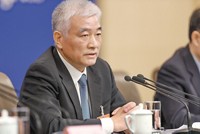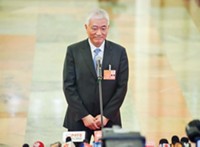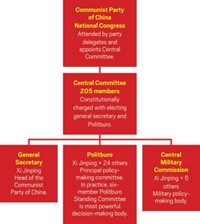Advertisement
Grab your lab coat. Let's get started
Welcome!
Welcome!
Create an account below to get 6 C&EN articles per month, receive newsletters and more - all free.
It seems this is your first time logging in online. Please enter the following information to continue.
As an ACS member you automatically get access to this site. All we need is few more details to create your reading experience.
Not you? Sign in with a different account.
Not you? Sign in with a different account.
ERROR 1
ERROR 1
ERROR 2
ERROR 2
ERROR 2
ERROR 2
ERROR 2
Password and Confirm password must match.
If you have an ACS member number, please enter it here so we can link this account to your membership. (optional)
ERROR 2
ACS values your privacy. By submitting your information, you are gaining access to C&EN and subscribing to our weekly newsletter. We use the information you provide to make your reading experience better, and we will never sell your data to third party members.
Policy
China’s Scientists Seek Less Government Interference In Their Work
Reform could bring change to university system
by Bree Feng
May 18, 2015
| A version of this story appeared in
Volume 93, Issue 20

As China’s leaders strive to turn the country into a scientific powerhouse, some of the nation’s scholars have identified excessive state meddling in research as a barrier to this goal. But recently announced government reforms could spell good news for China’s research community.
At the annual meeting of China’s National People’s Congress in March, Liu Zhongfan, a Peking University chemistry professor and Chinese Academy of Sciences member, called for change in the nation’s university management system, according to news reports. The government is “overly involved in academic evaluation, where they evaluate talents based merely on the number of articles they have published and the number of times the articles get cited,” Liu said.
A clamor for change is part of a wider debate in China about the state’s role in science as the country continues to raise its profile in the global research community. Not content to just catch up with other countries, Chinese officials want the nation’s scientists to become trailblazers. As President Xi Jinping said last June, the country’s science and technology development efforts must move toward “innovation, innovation, and innovation.”
China’s tradition of top-down planning is apparent in every major national endeavor, including the research sector. The government participates in selecting research projects, disbursing funds, and monitoring their use. The involvement is often opaque, inviting allegations of corruption and inefficiency. Although some funding agencies—notably the National Natural Science Foundation of China, a key funder of chemistry research—have a reputation for awarding grants on the basis of merit, the funding system as a whole has been publicly criticized.
“To obtain major grants in China, it is an open secret that doing good research is not as important as schmoozing with powerful bureaucrats and their favorite experts,” wrote Shi Yigong and Rao Yi in a 2010 Science article (DOI: 10.1126/science.1196916). Shi is the dean of the School of Life Sciences at Tsinghua University, as was Rao at Peking University until 2013.
A system that measures research productivity largely through publications, as China does, creates problems, says Richard P. Suttmeier, an expert on Chinese science and technology development issues and emeritus professor at the University of Oregon. Foremost among them is lack of originality—many papers from China add only incrementally to scientific knowledge, he says.
Nevertheless, this top-down model fueled recent rapid growth of Chinese science. According to official figures, China spent just 0.57% of its gross domestic product (GDP) on R&D in 1995. By 2014, R&D spending had risen to 2.09% of GDP, roughly $215 billion. China is now the world’s fourth-largest source of scientific research paper citations, according to a report last September by China’s Institute of Scientific & Technical Information. And in March, state news media outlet Xinhua reported that China aims to support R&D at higher than 3% of GDP, with 3% being the goal of many developed countries.
Peking’s Liu is not alone in decrying government meddling in science. At Zhejiang University, chemistry professor Fan Jie believes that government can play a positive role in applied science—for example, in facilitating technology transfers. But he maintains that the state is overly involved in basic research.
“Some of the Ministry of Science & Technology’s 973 projects had extremely detailed guidelines, to the extent that they even included guides as to targets of study and research methodology,” Fan says, referring to China’s national effort to support basic research, which is commonly called the 973 Program. Such prescriptions contradict the “freedom of exploration that basic science research requires and are not conducive to scientific innovation,” he says.
The government should provide research support, Fan says, but it should allow scientists “to be the principals” deciding research topics and methodology. He says scientists also should decide what research results are breakthroughs worthy of societal and academic recognition.
“We do need a more quiet and non-harebrained environment for teaching and research,” says Peking University Provost Gao Song. A freer academic environment would be more conducive to a culture of innovation, says Gao, who is also a professor of inorganic chemistry and the editor-in-chief of Inorganic Chemistry Frontiers. The government has tried to encourage universities and research institutions to exercise more independence, he notes, but officials are concerned about loss of control.
Recently unveiled reforms suggest that the government is willing to step back.
In January, the central government announced reforms in the oft-criticized system of project selection and funding. Most significant is the plan to transfer funding decisions to unspecified third-party institutes. At a news conference in March, Minister of Science & Technology Wan Gang said the government will distance itself from directly managing programs and instead focus on monitoring, evaluation, and creating development plans.
Also in March, the central government unveiled a model of economic growth driven by entrepreneurship and innovation. In this model, research institutes will be “encouraged to arrange programs independently, and the academic autonomy of higher education and research institutes, as well as the rights to choose research directions individually, will be expanded,” according to the official document. China will make it easier for foreign “technological talent” to apply for residence permits, and new regulations will be drafted to “encourage foreign research institutes to take part in national science and technology projects.”
Experts say the changes appear good on paper, but the scarcity of details makes it difficult to predict their efficacy.
Meanwhile, in Tianjin, a bustling metropolis less than an hour’s train ride from Beijing, the government’s support of reforms at China’s oldest university could serve as a model nationwide.
In Tianjin University, the School of Pharmaceutical Science & Technology is led by Jay S. Siegel, an American chemist who became the school’s dean two years ago. He says bureaucracy in China is worse than in the West, but he has personally not faced government interference in staffing or project selection. Instead, he has received the backing of Tianjin University President Li Jiajun and government officials to overhaul the school’s organization.
To that end, Siegel has embarked on creating a more professionalized administration, encouraging a culture of innovation, and attracting the best international talent. The State Administration of Foreign Experts Affairs, a government organization that aims to attract specialists to China, gave the school the top ranking this year for “quantity and quality of reforms” carried out in 2014, he says. “They said, ‘Great. Do more.’ ”
This fall, the school will become one of the first in China to launch a bachelor’s program in pharmacy taught completely in English, Siegel says.
“I wouldn’t have come here if I believed that we couldn’t do the things that we want to do,” he adds.
Bree Feng is a freelance writer based in Beijing.





Join the conversation
Contact the reporter
Submit a Letter to the Editor for publication
Engage with us on Twitter